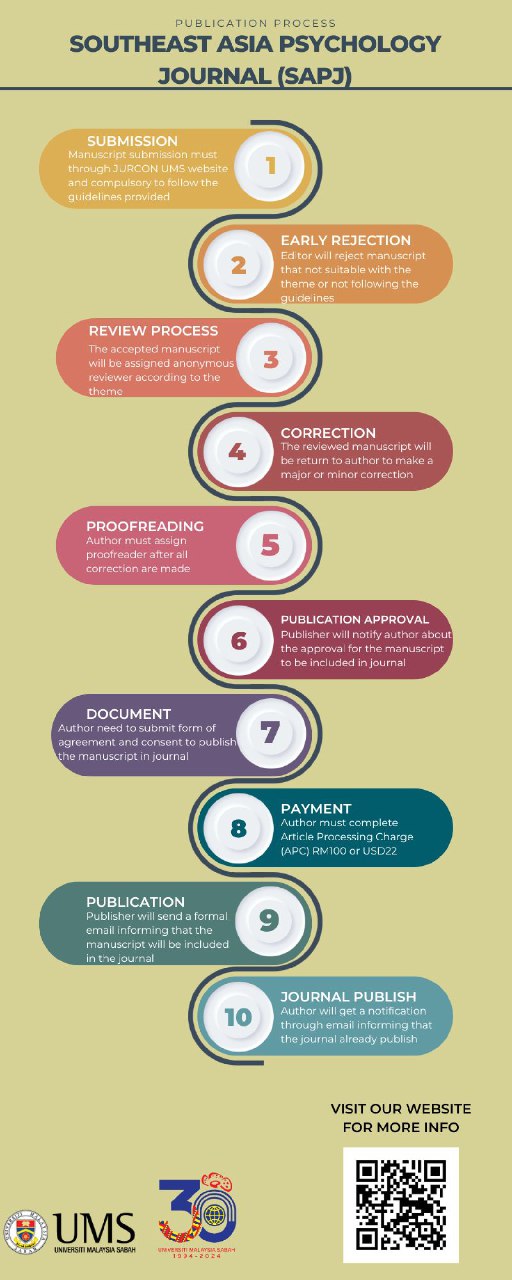REMEMBERING OR WRITING? IMPLICATIONS OF SELF-DISTANCING IN THE REFLECTION OF NEGATIVE EVENTS
DOI:
https://doi.org/10.51200/sapj.v8i1.5121Keywords:
Remembering, Writing, Self-Distance, Adaptive Self-ReflectionAbstract
Although many studies indicate that self-distancing facilitates adaptive self-reflection, it is necessary to examine the variables in the adaptive self-reflection process further to determine whether it will produce the same profile when the self-reflection is done through writing. As such, this study aims to examine a) whether the induction to remember from an actor's perspective and from an observer‘s perspective has the same implications as the induction to write using the first-person pronouns and using own-name in facilitating adaptive self-reflection, and b) whether adaptive self-reflection through writing has the same profile as adaptive self-reflection through remembering (thinking). Two quasi-experimental studies (N=428) conducted in this research found that
self-distancing was the only variable that differed significantly when we induced the actor's perspective and the observer's perspective (study 1), but the variables of self-distancing, emotional reactivity, and reconstruing differed significantly when self-reflection was conducted through writing manipulation using the first person pronouns and using own-name. It was also found that adaptive self reflection through writing (study 2) had a stronger correlation in the negative direction between self-distancing and emotional reactivity, recounting, avoidance, and in the positive direction with the variables of reconstruing, memory age, and perceived resolution, which meant that writing about negative experiences better facilitates adaptive self-reflection than just remembering. We also analyzed the intervening variables to see the direct or indirect relationship between key variables.
References
Ayduk, O., & Kross, E. (2009). Behaviour Research and Therapy Asking ‗ why ‘ from a distance facilitates emotional processing : A reanalysis of Wimalaweera and Moulds ( 2008 ) q. Behaviour Research and Therapy, https://doi.org/10.1016/j.brat.2008.06.014 47(1), 88–92.
Ayduk, O., & Kross, E. (2010). From a Distance: Implications of Spontaneous Self-Distancing for Adaptive Self-Reflection. Journal of Personality & Social Psychology, 98(5), 809–829.
Beal, G., Sexton, J, D., & Pennebaker, J. . (2002). The role of story making in Disclosure Writing: The Psychometric of Narrative. Psychology and Health, 17(5), 571–581.
Berstein, A., & Et.all. (2015). Decentering and Related Constructs: A Critical Review and Meta-Cognitive Processes. Perspectives on Psychological Science.
Danoff-burg, S., Mosher, C, E., Asani, H., & John, D, S. (2010). Does Narrative Writing Instruction Enhance the Benefits of Expressive Writing?
Anxiety Stress Coping, https://doi.org/10.1080/10615800903191137 23(3), 341–352.
Davis, J. I., Gross, J. J., & Ochsner, K. N. (2011). Psychological Distance and Emotional Experience : What You See Is What You Get. Emotion,
(April https://doi.org/10.1037/a0021783 2011), 438–444.
Esparza, N. ., & Pennebaker. (2006). Do Good Stories Produces Good Health? Benjamin Publishing Co.
Fergussen, P. A. (1993). Writing about Traumatic Events using the Third Person Pronoun: Psychological and Health Effects.
Fujita, K., & J.J, C. (2012). Transcending Temptation Through Abstraction: The Role of Construal Level in Self-Control. The Ohio State University








